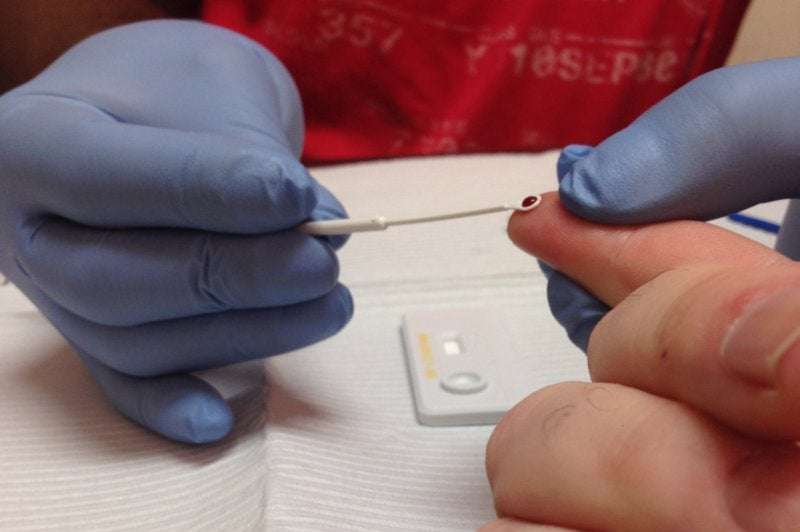An HIV rapid test. A new variant of the virus has been identified, according to researchers. Photo by Equality Michigan/Wikimedia Commons
Feb. 3 (UPI) -- Researchers in the Netherlands have identified what they describe as a highly virulent variant of HIV that has been circulating in the European nation since the 1990s, they said in an analysis published Thursday by the journal Science. Based on blood samples collected from 109 infected adults in the country, those with the strain have nearly six-fold higher levels of the virus in their systems than people with other forms, the data showed. Advertisement
They also had lower levels of antibodies against the virus and increased "infectivity," meaning they have more of the virus in their systems and may be more likely to spread it to others, the researchers said.
"Viruses can and do evolve to be more virulent, even those that have been infecting humans for more than a century," infectious disease expert Joel Wertheim, who authored a commentary on the findings, told UPI in an email.
"Although this variant appears more virulent and transmissible, the same public health approach of testing, linkage to care and rapid provision of antiretroviral drugs are still our best options," said Wertheim, an associate adjunct professor at the University of California-San Diego.
About 38 million people globally have been infected with HIV, according to the World Health Organization.
Although the number of new HIV infections in the United States has declined in recent years, about 35,000 people across the country test positive annually, HIV.gov estimates. HIV.gov is a site that provides access to U.S. government HIV and AIDS information derived from several dozen agencies.
RELATED Pressure mounts to ease blood donor rules for gay men
The Dutch researchers identified 109 people with a "distinct strain" of HIV they called the "subtype-B HIV-1 VB variant" among more than 6,600 participants in an ongoing national study of the virus and its effects.
By the time the people in the study were diagnosed, they were vulnerable to developing AIDS within two to three years, the researchers said.
This is a faster progression than what is seen with other HIV strains, which normally take up to 10 years to develop into AIDS, assuming the infected person does not receive treatment, according to HIV.gov.
However, the new strain does not necessarily pose a "public health crisis," given that it still responds to currently available treatments and does not appear to weaken the effectiveness of pre-exposure prophylaxis, or PrEP, drugs designed to prevent infection, Wertheim said.
"I am not particularly concerned about the impact of this, or similarly variants, undoing the work to end the epidemic in the U.S.," Wertheim told UPI.
"The variant characterized in this new study responds like other HIV strains to antiretroviral therapy, and I expect PrEP would be effective against this variant, as well," he said.

JeanClaudeMonet on February 4th, 2022 at 01:31 UTC »
Good thing I don't have sex.
gibubby on February 4th, 2022 at 00:18 UTC »
TLDR: It’s been around since the 90s, people infected with this strain have higher viral loads and develop AIDS quicker, provided no medication. Current HIV medications and PreP are as effective in treatment as other less viral strains.
Everybody remain calm.
Edwinus on February 3rd, 2022 at 23:13 UTC »
Oh wow aids that's so retro